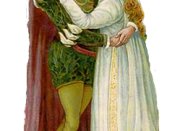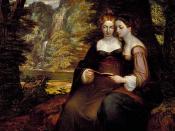Theme Analysis
In A Midsummer Night's Dream, Shakespeare shows many different kinds of love and marriage. There is the mature love of Theseus and Hippolyta; the more frantic, passionate and unstable love of the young people; and the power struggle between Oberon and Titania. The emphasis is both on the value of love and its strange, irrational aberrations, particularly those associated with the excesses and sudden u-turns of romantic love. The Pyramus and Thisbe play-within-the-play shows (albeit softened by farce), that love can also have tragic outcomes. Pyramus and Thisbe both die, like Romeo and Juliet, because of a misunderstanding. Perhaps as they watch Pyramus and Thisbe, the quartet of lovers might feel particularly grateful that the misunderstandings they went through in the wood were sorted out for good rather than ill.
There are many contrasts in the play, including that between reason and imagination, or between the rational and the nonrational elements in human experience.
To a Renaissance person there would be no doubt about which was the superior. Reason, the intellect, the discriminating faculty, was what lifted human life above that of the beasts. Not only should reason rule passion, it should also supervise the imagination, which might otherwise run wild, without any basis in reality. This perspective is embodied in Theseus's speech at the beginning of Act 5. Theseus does not believe that what happened to the lovers has any validity; lovers, madmen, and poets rely on imagination, and yet what they dream up has no real substance.
Hippolyta disagrees with her new husband, and the play would seem to lend more support to her view than to his. Theseus's philosophy works well in the rational, orderly world of the court, where the ordinary laws of society function. But it cannot sort out the...


